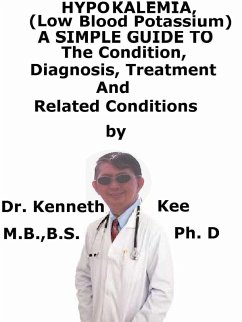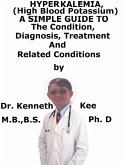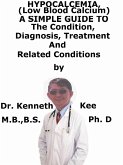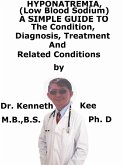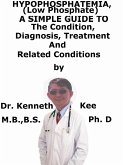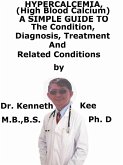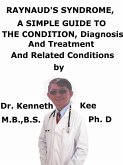Hypokalemia indicates low potassium in the blood that can give rise to symptoms of muscle weakness, fatigue, muscle cramps and even paralysis.
Hypokalemia is the term for low Potassium in the blood.
Normal blood potassium ranges from 3.4 to 5.7 mmol per liter.
Hypokalemia happens when blood's potassium levels are too low.
Hypokalemia is also called:
a. Hypokalemic syndrome
b. Low potassium syndrome
c. Hypopotassemia syndrome
Extra-cellular potassium level represents only 2 per cent of the total body potassium.
Potassium has a major presence in the intracellular volume of cells and intracellular osmolarity.
It is an also an important cofactor in many metabolic actions.
The resting membrane potential and excitable tissues such as nerves are mostly determined by ratio of intracellular to extra-cellular potassium concentrations.
Plasma and extra-cellular potassium levels are involved by many factors particularly acid based balance.
Acidosis moves potassium out of cells while alkalosis shifts potassium into cells.
Potassium is an important electrolyte for nerve and muscle cell functioning, particularly for muscle cells in the heart.
The kidneys regulate the body's potassium levels, allowing for excess potassium to leave the body through urine or sweat.
Hypokalemia happens with gastrointestinal or urinary loss particularly after the use of potassium wasting diuretics or in diabetes mellitus.
Mild hypokalemia does not cause symptoms.
In some cases, low potassium levels can cause arrhythmia, or abnormal heart rhythms, and severe muscle weakness.
But these symptoms normally reverse after treatment.
Potassium is an electrolyte (mineral) that is needed for cells to function properly.
The patient gets potassium through food.
The kidneys eliminate excess potassium through the urinary system to maintain a proper balance of the mineral in the body.
It may be because too much potassium is leaving through the digestive tract.
Most often, the patient gets hypokalemia when: he or she:
1. Vomits a lot
2. Has diarrhea
3. The kidneys or adrenal glands do not work well
4. Takes medication that makes the patient urinates (diuretics)
It is possible, but rare, to get hypokalemia from having too little potassium in the diet.
Other things occasionally cause it, too, such as:
1. Drinking too much alcohol
2. Sweating a lot
3. Folic acid deficiency
4. Certain antibiotics such as penicillins
5. Diabetic ketoacidosis (high levels of acids called ketones in the blood)
6. Laxatives taken over a long period of time
7. Certain types of tobacco
8. Some asthma medicines
9. Low magnesium
10. Adrenal gland issues
11. Malnutrition
12. Poor absorption
13. Hyperthyroidism
14. Delirium tremens
15. Renal tubular acidosis types I and 2
16. Catecholamine surge, such as with a heart attack
17. Eating substances like bentonite (clay) or glycyrrhizin (in natural licorice and chewing tobacco)
18. Dilution due to IV fluid administration
19. Drugs such as insulin and beta 2 agonists used for COPD and asthma
20. Barium poisoning
Several syndromes can be linked with low potassium, such as:
1. Cushing syndrome, a rare condition due to long-term exposure to cortisol
2. Gitelman syndrome, a rare genetic kidney disorder that causes an imbalance of ions in the body
3. Liddle syndrome, a rare disorder that causes an increase in blood pressure and hypokalemia
4. Bartter syndrome, a rare genetic kidney disorder that causes salt and potassium imbalance
5. Fanconi syndrome
6. Familial hypokalemia
Women are likely to have hypokalemia more often th...
Dieser Download kann aus rechtlichen Gründen nur mit Rechnungsadresse in A, B, CY, CZ, D, DK, EW, E, FIN, F, GR, H, IRL, I, LT, L, LR, M, NL, PL, P, R, S, SLO, SK ausgeliefert werden.

